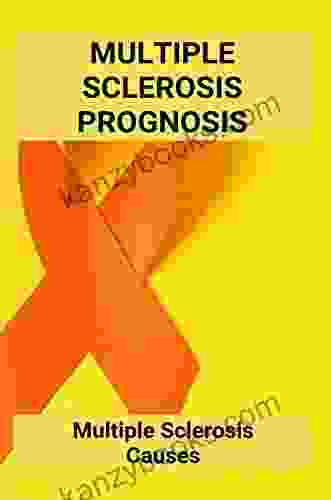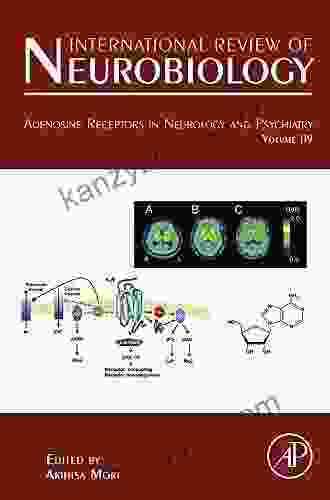Adenosine Receptors: A Novel Frontier in Neurology and Psychiatry

Adenosine, a purine nucleoside, plays a crucial role in a wide range of physiological processes, including energy metabolism, neurotransmission, and immune regulation. Its effects are mediated through four subtypes of adenosine receptors (ARs): A1, A2A, A2B, and A3. These receptors are expressed throughout the central and peripheral nervous systems, where they modulate neuronal activity and influence various neurological and psychiatric disFree Downloads.
Preclinical Evidence for Therapeutic Potential
Extensive preclinical research has demonstrated the therapeutic potential of targeting ARs in neurological and psychiatric disFree Downloads.
4 out of 5
| Language | : | English |
| File size | : | 35191 KB |
| Text-to-Speech | : | Enabled |
| Screen Reader | : | Supported |
| Enhanced typesetting | : | Enabled |
| Print length | : | 884 pages |
- A1 receptors: Activation of A1 receptors has shown neuroprotective effects in models of stroke, ischemia, and epilepsy. It also modulates cognitive function and has potential implications in neurodegenerative diseases such as Alzheimer's and Parkinson's.
- A2A receptors: A2A receptors are involved in regulating movement, reward, and motivation. Their modulation has shown promise in treating Parkinson's disease, drug addiction, and attention deficit hyperactivity disFree Download (ADHD).
- A2B receptors: A2B receptors play a role in inflammation and immune responses. Their inhibition has shown therapeutic effects in models of multiple sclerosis, rheumatoid arthritis, and inflammatory bowel disease.
- A3 receptors: A3 receptors are involved in nociception and pain perception. Their activation has shown analgesic effects and may have potential applications in chronic pain management.
Clinical Applications
Based on the preclinical findings, several AR ligands have been developed and tested in clinical trials.
- A1 receptor agonists: A1 receptor agonists have shown promising results in treating cognitive impairment in Alzheimer's disease and mild cognitive impairment (MCI). They have also been evaluated in stroke and epilepsy, with varying results.
- A2A receptor antagonists: A2A receptor antagonists have shown efficacy in improving motor function in Parkinson's disease and reducing cocaine seeking in drug addiction. They are also being investigated in ADHD and schizophrenia.
- A2B receptor antagonists: A2B receptor antagonists have shown therapeutic effects in multiple sclerosis and rheumatoid arthritis. They are also being evaluated in inflammatory bowel disease and other immune-mediated disFree Downloads.
- A3 receptor agonists: A3 receptor agonists have shown analgesic effects in animal models and are being evaluated in clinical trials for treating chronic pain.
Challenges and Future Directions
Despite the promising preclinical and clinical data, several challenges remain in targeting ARs for therapeutic purposes. These include:
- Selectivity: Developing selective ligands for specific AR subtypes is crucial to avoid off-target effects.
- Blood-brain barrier penetration: Many AR ligands have poor brain penetration, limiting their therapeutic potential in neurological disFree Downloads.
- Long-term safety and efficacy: Long-term clinical studies are needed to assess the safety and efficacy of AR ligands in various neurological and psychiatric disFree Downloads.
Current research efforts are focused on addressing these challenges and developing improved AR ligands with enhanced selectivity, brain penetration, and therapeutic efficacy.
Adenosine receptors represent a promising target for the treatment of neurological and psychiatric disFree Downloads. Extensive preclinical and clinical research has demonstrated the therapeutic potential of targeting ARs, leading to the development of several novel drugs. While challenges remain, ongoing research is paving the way for the development of more effective and targeted AR ligands, offering new hope for patients with these debilitating conditions.
4 out of 5
| Language | : | English |
| File size | : | 35191 KB |
| Text-to-Speech | : | Enabled |
| Screen Reader | : | Supported |
| Enhanced typesetting | : | Enabled |
| Print length | : | 884 pages |
Do you want to contribute by writing guest posts on this blog?
Please contact us and send us a resume of previous articles that you have written.
 Book
Book Novel
Novel Page
Page Chapter
Chapter Text
Text Story
Story Genre
Genre Reader
Reader Library
Library Paperback
Paperback E-book
E-book Magazine
Magazine Newspaper
Newspaper Paragraph
Paragraph Sentence
Sentence Bookmark
Bookmark Shelf
Shelf Glossary
Glossary Bibliography
Bibliography Foreword
Foreword Preface
Preface Synopsis
Synopsis Annotation
Annotation Footnote
Footnote Manuscript
Manuscript Scroll
Scroll Codex
Codex Tome
Tome Bestseller
Bestseller Classics
Classics Library card
Library card Narrative
Narrative Biography
Biography Autobiography
Autobiography Memoir
Memoir Reference
Reference Encyclopedia
Encyclopedia Stefan Brozin
Stefan Brozin Michael Gisman
Michael Gisman William Porter
William Porter Sheela Prakash
Sheela Prakash Kristin Mcgee
Kristin Mcgee Shannon Guerra
Shannon Guerra Susan Ellerbeck
Susan Ellerbeck Mimi Barbour
Mimi Barbour Wiley Mullins
Wiley Mullins Tonie Mapson
Tonie Mapson Vin Zeno
Vin Zeno Scott Abel
Scott Abel Lisa Lewison
Lisa Lewison Tom Daley
Tom Daley Yitzchak Goldman
Yitzchak Goldman Supriya Bhagwani
Supriya Bhagwani James Path
James Path Lee Harrington
Lee Harrington Marie Spilotro
Marie Spilotro Wilfred M Mcclay
Wilfred M Mcclay
Light bulbAdvertise smarter! Our strategic ad space ensures maximum exposure. Reserve your spot today!

 Jessie CoxWalking Next to Cancer: A Patient's Journey Through Diagnosis, Treatment, and...
Jessie CoxWalking Next to Cancer: A Patient's Journey Through Diagnosis, Treatment, and...
 Blake KennedyIndulge in the Art of Culinary Cannabis: 150 Medical Marijuana Edibles for...
Blake KennedyIndulge in the Art of Culinary Cannabis: 150 Medical Marijuana Edibles for...
 Richard AdamsDr Sebi Alkaline Diet Guide: Unlocking the Secrets to Eradicating Asthma,...
Richard AdamsDr Sebi Alkaline Diet Guide: Unlocking the Secrets to Eradicating Asthma,... Floyd PowellFollow ·7k
Floyd PowellFollow ·7k Jace MitchellFollow ·14.4k
Jace MitchellFollow ·14.4k Forrest ReedFollow ·10.1k
Forrest ReedFollow ·10.1k Samuel WardFollow ·2.7k
Samuel WardFollow ·2.7k Devin CoxFollow ·15.8k
Devin CoxFollow ·15.8k Dale MitchellFollow ·15.7k
Dale MitchellFollow ·15.7k Alfred RossFollow ·19.7k
Alfred RossFollow ·19.7k Marc FosterFollow ·18k
Marc FosterFollow ·18k

 Virginia Woolf
Virginia WoolfGetting High Fat Diet Easily Using Keto Fat Bomb Cookbook
Unveiling the Power of Fat...

 Milan Kundera
Milan KunderaAre You Cryin' Brian? Find the Inspiration and Humor in...
Life can be full of...

 Edmund Hayes
Edmund HayesUnlock Your Vitality: The 15-Day Natural Energy Boost...
Are You Ready to...

 Gavin Mitchell
Gavin MitchellMultiple Sclerosis Life Expectancy: Unveiling the Impact...
Multiple Sclerosis (MS) is a...

 Gabriel Garcia Marquez
Gabriel Garcia MarquezGet The Thighs That Can Crack Man Head Like Walnut
Are you tired of weak, flabby...
4 out of 5
| Language | : | English |
| File size | : | 35191 KB |
| Text-to-Speech | : | Enabled |
| Screen Reader | : | Supported |
| Enhanced typesetting | : | Enabled |
| Print length | : | 884 pages |








